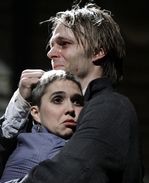SITE GUIDE
SEARCH
REVIEWS
REVIEW ARCHIVES
ADVERTISING AT CURTAINUP
FEATURES
NEWS
Etcetera and
Short Term Listings
LISTINGS
Broadway
Off-Broadway
NYC Restaurants
BOOKS and CDs
OTHER PLACES
Berkshires
London
California
New Jersey
DC
Connecticut
Philadelphia
Elsewhere
QUOTES
TKTS
PLAYWRIGHTS' ALBUMS
LETTERS TO EDITOR
FILM
LINKS
MISCELLANEOUS
Free Updates
Masthead
A CurtainUp Review
Orestes: A Tragic Romp
| I have allowed myself liberties and equivalencies; transadaptation may be the right term.— Cutting-edge playwright Anne Washburn about her take on Euripides. .
|

Holly Twyford as Electra and Jay Sullivan as Orestes
|
While "transadaptation" sounds like one of those words that gets tossed into academic discussions, "romp," in this case, is definitely miscast. There is nothing playful or boisterous about the ending, just silliness — Except that it detracts from the seriousness that came before, what is the point of the actors waving little green and yellow flags in the last scene? Some of that is in Euripides but not all.
The evening begins with a long and moving soliloquy by Electra played with force and sincerity by the ever-versatile Holly Twyford. She sets the scene, telling what has happened so far, the backstory in contemporary lingo, with an occasional aside of sarcasm. Her hands are never still as she nervously fingers a stone. Her brother (and partner in crime) Orestes (Jay Sullivan) is curled up in a fetal position lies silently on a stone bench behind her. They are awaiting sentencing for the crime of having murdered their mother, Clytemnestra. One possibility is that the siblings will be stoned to death — hence the symbolism of the set's resemblance to sunlit stone walls adorned by Ionian masks, with, patches of stones on the ground making intriguing sounds as the players, particularly the chorus, walk or run across them.
An egregiously camp gender-bending Helen of Troy, sister of the deceased, is played by Chris Genebach in a cape-like coat Joan Crawford might have worn add to the narrative by dishing family dirt. Her costume, fey mannerisms, and use of contemporary colloquialisms are distracting. Orestes calls Helen "a radioactive packet." Genebach also plays Menelaus and Pylades. His bravado with these parts is more suited to a twentieth-century macho tv cop. The performance seems incongruous with the rest of the production, leaving one wondering why director Aaron Posner gave this actor license to a style that seems alien to the rest of the production.
Jay Sullivan, who was terrific in Studio Theatre's The History Boys is challenged by the role of Orestes. His scenes with Electra are engrossing but when Euripides/Washburn's play goes for a happy, Hollywood-like ending, his character, the direction and indeed this "transadaptation" loses its grip.
This production does have highlights, besides Electra: Tyndareus, also played by Holly Twyford, wearing a bowler hat and affecting a limp; Margo Seibert's Hermione as she narrowly escapes a cut throat, and Lynn Redgrave (in a recording) as the voice of Apollo. The chorus speaks and sings quite beautifully as one. Their movement, choreographed by Patty Gallagher, is usually effective. Daniel Conway's set evokes everywhere/anywhere and no specific era; Jessica Ford's costumes, particularly Electra's robes and the chorus's H&M-meets-Greek-tragedy jackets, gossamer skirts and work boots seem appropriate. Tyler Micoleau's lighting adds to the ambiance. He makes the not-quite-believable ending startling.
|
Orestes A Tragic Romp Translated/adapted by Anne Washburn Directed by Aaron Posner Cast: Lauren Culpepper, Rebecca Hart, Marissa Molnar, Margo Seibert, Rachel Zampelli (chorus); Chris Genebach, (Helen of Troy, Menelaus, Pylades, Trojan Slave); Margo Seibert (Hermione); Jay Sullivan (Orestes, Messenger); Holly Twyford (Electra, Tyndareus.) Composer, James Sugg Movement Director, Patty Gallagher Scenic Design, Daniel Conway Costume Design, Jessica Ford Lighting Design, Tyler Micoleau Running time: 1 hour and 40 minutes, no intermission From 1/27/10 to 3/07/10 Folger Theatre, 201 East Capitol Street, SE; Washington, DC 20003-1004; 202-544-7077; www.folger.edu/theatre Review based on February 3, 2010 performance. |
|
Subscribe to our FREE email updates with a note from editor Elyse Sommer about additions to the website -- with main page hot links to the latest features posted at our numerous locations. To subscribe,
E-mail: esommer@curtainup.comesommer@curtainup.com
put SUBSCRIBE CURTAINUP EMAIL UPDATE in the subject line and your full name and email address in the body of the message -- if you can spare a minute, tell us how you came to CurtainUp and from what part of the country. |
|
REVIEW FEEDBACK Highlight one of the responses below and click "copy" or"CTRL+C"
Paste the highlighted text into the subject line (CTRL+ V): Feel free to add detailed comments in the body of the email. . .also the names and emails of any friends to whom you'd like us to forward a copy of this review. |





